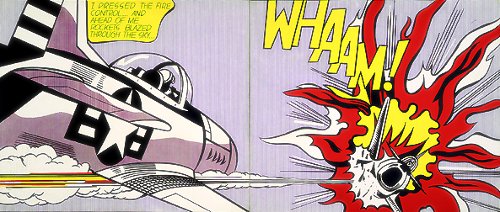Target overload in language learning
A friend mentioned the idea of target overload in language learning to me, and I think it’s a really useful concept. It captures a problem I often encounter and that I’m sure other learners do as well.
Target overload apparently arose with fighter pilots, although I can’t find much reference to it online. The idea is that if a pilot is faced with several potential targets at once, they’re likely to dither so much that they fail to attack any of them before the opportunity passes. The likelihood of this increases not just with the number of targets, but also with how inviting the targets are.
[caption id="attachment_7415” align="aligncenter”] If only it were this easy. [Source][/caption]
If only it were this easy. [Source][/caption]
That last point is the important one in language learning, I think. It’s interesting because it’s a problem that seems to appear almost exclusively in the intermediate stages. When you’re a beginner, you either have no idea how to say something, or have one set expression for it. You roll off the expression you’ve memorised and the job is done. If you’re an advanced learner, you’re so familiar with the language that a natural expression just comes out fluently.
But as an intermediate learner, you frequently encounter target overload. There’s something you need to express, but you’ve got too many options for how to do it. You know that all of them have potential, but you’re not experienced enough to rapidly pick the good from the bad, or the excellent from the good. Here are some examples of the sort of things that can stall my response in Chinese:
- Saying it that way is too basic!
- I don’t think that word is exactly what I mean.
- Oh wait, there’s a better word / structure!
- Would this be better as structure A or structure B?
- I’m sure I know a chengyu for this..
- I’ve seen a word used for this once or twice, do I risk trying it out now?
- I’m sure it’s right, but I’ve only tried to say that once before. Hilarity ensued.
- I learnt this word yesterday, it’d be cool to use it now.
This is closely related to the issue of interference that’s often discussed in the study of memory. You learn fact A and have no trouble remembering it. Then you come across the very similar fact B, and you start getting both of them mixed up. In this case, knowing more ends up interfering with your knowledge, and actually makes you worse, until you get more familiar with both facts.
And of course there are decisions about how to respond or express that aren’t due to the language itself, but periphery factors. A quick example: if a native English speaker asks me where I’m from in the UK, I’ll just say “York”. But I’ve found that Chinese people often haven’t heard of 约克, or will ask me if it’s 约克郡 (Yorkshire), which apparently is more famous.
So I went through a phase of stalling on that question while I decided whether to say 约克, 约克郡 or just say “东北方” (the North-East). On top of that there’s the issue of whether or not I specify I’m from England (英格兰), as 英国 actually refers the UK as a whole. I soon settled on always saying 约克郡, but for a while I’d consistently get target overload with that simple question.
Clearly it’s a case of massive over-thinking, but it’s so easy to do when you’re not totally fluent. It’s not a case of not having the vocabulary to answer the question, it’s a case of there being too many other factors involved in choosing the best word.
Target overload in listening
Target overload doesn’t just apply to speech production. It find it happens at least as much with listening, where I haven’t heard clearly. I’m trying to choose between a few different options that what I heard could have been, all the while trying to keep track of what else is being said. This can even crop up from time to time in reading, with confusable words or hanzi appearing in an ambiguous context.
Target under-load?
There is also an inverse problem that occurs more at the early stages of learning a language. Because your vocabulary is limited, and you’re constantly on the look-out for what you’ve learned, you tend to hear it everywhere all the time, even when it’s not actually being used. Later you realise that it’s because your ability to distinguish and recognise words is limited, so everything seems to warp into the words you do know. It’s sort of like pareidolia for vocabulary.
Solutions?
I’m not sure that there are any specific solutions for target overload. As with most things in language learning, you’ve just got to get enough input and practice that appropriate expressions just come to you naturally. It’s also worth noting that target overload also happens to native speakers (e.g. in job interviews), so it’s not something you can hope to eliminate entirely.
